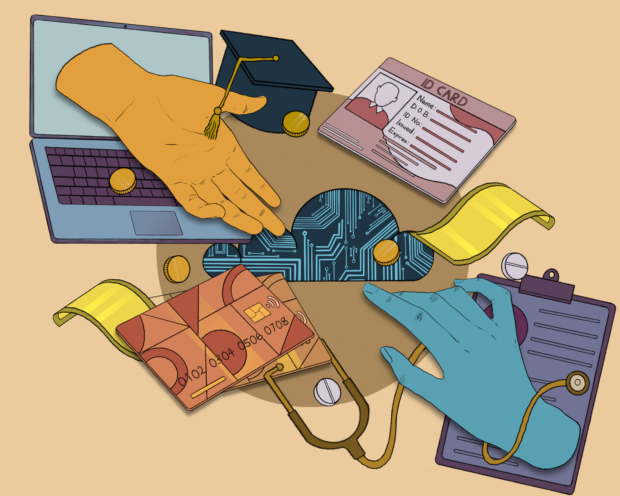When I took on the role of CEO at the Digital Impact Alliance, one of my top priorities was promoting an equitable, inclusive data future for all. This is a huge undertaking, one that requires massive investment in foundational digital components, such as widespread broadband, digital skills initiatives, and digital public infrastructure.
These foundations, once in place, enable the creation of vast amounts of data. And, when properly harnessed, data can provide meaningful benefits and maximize value for people across the world.
To help make this vision a reality, we’ve devoted our efforts to better understanding, analyzing, and documenting good data infrastructure – including the different models, terms, and approaches that comprise it.
The data ecosystem is both critical and complex. These insights can inform future efforts to meaningfully benefit individuals, society, and our planet.
Over the past months, we’ve done substantial research to answer these questions – diving deep, gathering insights, and learning from the experiences of trusted experts and decision-makers across the world. Here are just a few key highlights from what we’ve gathered:
Governments around the world are implementing national data exchange systems, as they seek to reduce costs and improve efficiency.
In our research, we’ve found similarities across countries in what makes good data exchange and allows governments to promote public service delivery and ease bureaucracy. When these systems are created to be interoperable, accessible, and inclusive, they can provide a number of benefits to both governments and citizens. In Uganda, for example, the government’s UGhub platform has reduced wait times and improved efficiency on a number of crucial services, including passport applications, work permit applications, and vehicles registration. And, in Rwanda, with its Irembo platform, the government has seen equally impressive results. This citizen portal has saved citizens over 100 million working hours and reduced service access time by 80%.
From these experiences, we can glean insights into successful technology implementation, sustained adoption, and trust. (Hint: it’s all about people!)
For countries to achieve long-term success in their data exchange efforts, there are a number of crucial factors to take into consideration. By prioritizing elements like data protection and citizen satisfaction, governments can advance data exchange systems that are not only efficient and useful, but that also boast high standards of citizen buy-in and trust. Take Bangladesh for example. Over the past few years, the government has established 9,000 digital centers across the country, allowing citizens to access essential public services digitally and reducing time spent by 78%. The centers employ local civil servants, each of whom receive empathy training to help foster a trusted, transparent environment and ensure citizens’ needs are being met. This approach has proven successful, as evidenced by a 76% citizen satisfaction rate, up from 50% in 2018.
Yet, our research isn’t restricted to government efforts. There are other models for unlocking data that offer insights into how people and communities can be at the heart of it all.
Governments are not the only ones driving efforts to enable the freer flow of data. Many models exist – from data fiduciaries to personal data stores – which are illuminating practices related to governance, ethical use, and data access. For example, approaches like data trusts can offer a means of addressing traditional challenges of access and sustainability. PLACE Fund, a nonprofit organization focused on providing granular mapping data, illustrates the vast potential of this governance structure. By employing a fiduciary to manage access, this small organization has found a way not only to collect and share relevant data, but to do so ethically and profitably. Importantly, PLACE provides one example of an innovative model that simultaneously allows data to be properly managed and safeguarded, while still ensuring it can be accessed for the public good. If we are to break the power imbalance that often exists, there’s so much to learn from this model – and others like it – that showcase how to govern data differently.
Ultimately, though, if we are going to get it right, we need to learn from broad experiences but also from people themselves.
We recently sat down with a group of women working in Ghana’s informal economy to learn about their experiences using the country’s GhanaCard digital ID. For these women, who work tirelessly to provide for their families, often making around $3 USD per day, access to digital services could have significant impact. Yet, as is often the case with digital technology, the results were mixed. While the women praised the platform for its ability to expand economic opportunities and promote digital payments, they also lamented issues like lack of consent, digital literacy, and privacy concerns. As one participant, Vida, explained, “I worry about my information falling into the wrong hands.” Her experience, and those of her peers, underscores the duality that frequently exists with technology, which can promote positive progress, economic development, and inclusion, while simultaneously creating legitimate issues. Promoting practices like informed consent, trust and transparency, and digital literacy are key to addressing these concerns – and realizing the full potential of data exchange.
So, how do we make this vision a reality? In these efforts to foster a positive data ecosystem, philanthropy can play a unique role.
Unlike traditional infrastructure, which must be built in town after town, data infrastructure is eminently scalable. This presents an opportunity for those like philanthropists, who, thus far, have had limited engagement in the infrastructure sector. Philanthropic targeted investment can advance representative, relevant data to help solve real-world problems – which would have profound economic and social benefit. In our call-to-action paper, we’ve outlined several of these opportunities, highlighting seven “big bets” for collective impact, as well as different roles that philanthropists can play in fostering a positive data future. We look forward to collaborating with likeminded partners to help build out these ideas.
These insights – while critical - are only the beginning.
Efforts to get data out of the traditional silos is at the heart of ensuring digitalization promotes – rather than undermines – a future where the value of data is evenly felt. Our work, spanning design and implementation decisions, effective governance, and essential principles, is seeking to do just that – by promoting sustainable, equitable, and inclusive practices.
As we continue our efforts to unlock trustworthy, responsible data, we have a lot more planned, like an upcoming spotlight on decentralized networks from our climate data Joint Learning Network. At the same time, as a global thought partner and trusted resource, we want to help unpack this conversation even more. While of course we don’t have all the answers, we’re here to learn alongside you.
So, let us know: what should we focus on next?





